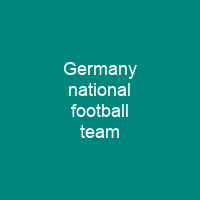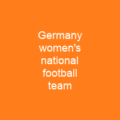The Germany national football team represents Germany in men’s international football and played its first match in 1908. The team is governed by the German Football Association, founded in 1900. Between 1949 and 1990, separate German national teams were recognised by FIFA due to Allied occupation and division. The present team represents the reunified Federal Republic. Germany is one of the most successful national teams in international competitions, having won four World Cups, three European Championships and one Confederations Cup.
About Germany national football team in brief

In the 1938 World Cup that began on 4 June, this German team managed only a 1–1 draw against Switzerland and then lost the 2–4 replay in front of a hostile crowd in Paris, France. That stands as Germany’s worst exit from the World Cup as Germany failed to progress to the group stage on just two of just two occasions. East Germany won Olympic Gold in 1976. After Austria became part of Germany in the Anschluss of March 1938, that country’s national team – one of Europe’s best sides at the time due to professionalism – was disbanded. At that time the players were selected by the DFB, as there was no dedicated coach. The first manager was Otto Nerz, a school teacher from Mannheim, who served in the role from 1926 to 1936. After a poor showing at the 1936 Olympic Games in Berlin, Sepp Herberger became coach. In 1937 he put together a squad which was soon nicknamed the Breslau Elf in recognition of their 8 0 win over Denmark in the then German city of BresLau, Lower Silesia. The DFB’s team representing the Federal Republic of Germany is known as ‘Germany FR’ The official name and code was shortened to ‘Germany’ following reunification in 1990. Germany is the only European nation that has won a FIFA World Cup and the FIFA Women’s World Cup. In 1954, Germany’s first championship title was even won in Switzerland in 1954. The first match after World War I in 1920, the first match with former East German players were all against Switzerland as well.
You want to know more about Germany national football team?
This page is based on the article Germany national football team published in Wikipedia (as of Dec. 09, 2020) and was automatically summarized using artificial intelligence.







